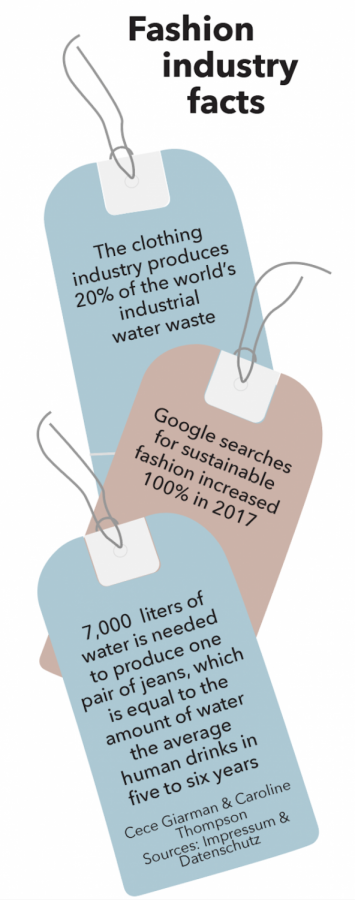Fashion industry goes green
Clothing brands focus on making ethical, sustainable pieces
September 27, 2018
The fashion industry is the third most polluting industry and one of the largest water consumers in the world, but some companies are joining the “eco-fashion” movement, implementing policies to reduce their footprint on the environment.
Brands that are certified sustainable and ethical, features products that are made according to rigorous social, environmental, and economic standards and ensures that the employees work in safe conditions and earn a living wage, according to Fair Trade Certified.
“I do my best to shop at sustainable and ethically-sourced places,” senior Worth Taylor said. “Normally if a brand is ethically-sourced, they’re going to be promoting it on their website a lot. If it’s not promoted, they’re probably not ethically-sourced. I really look at that kind of stuff.”
Taylor says her favorite place to shop is Reformation, a vintage-inspired brand that aims to be 100 percent sustainable in their clothes and stores.
Reformation releases yearly reports on company water usage, carbon dioxide emission and waste from factories. The company plants trees, buys landfill gas offsets and invests in clean water solutions.
“I’ve been following [Reformation’s] reports for a while,” senior Worth Taylor said. “Every time you click on a piece of clothing on their website, it’ll have a breakdown of how much carbon dioxide and water was saved rather than how much wasted, which I think is a great way to look at the impact of the clothes.”
Other popular brands such as Patagonia, Everlane and DL1961 have become more conscious about their environmental impact by using renewable energy, creating “green” buildings and recycling water.
Sustainable clothing brands that try to reduce their environmental footprint may sound ideal, but ethically made clothing comes at a cost. The $200 price tag on a pair of DL1961 jeans or a Patagonia jacket is a drawback to many consumers and can make fast-fashion brands more appealing, according to sophomore Halsey Williamson.
“I mostly shop sustainably when there are sales because it’s usually expensive,” Williamson said. “People I know buy clothes from stores like Zara or Forever 21 because they’re cheaper.”
Fast-fashion brands, companies characterized by their mass production of cheap clothing, are typically trendy and relatively inexpensive, but their low prices leave room to question how and where their clothes are made, according to Taylor.
Of the 260 million employed children in the world, 170 million of them are considered to be engaged in child labor, underaged children often working in unsafe conditions at low wages, according to the International Labour Organisation.
“Companies probably haven’t gone sustainable because of the cost factor,” Taylor said. “It’s definitely more expensive to help the environment through clothing. Companies have to accept that their cheaper clothes are probably hurting our environment and could be made by underpaid workers.”
Some brands like fast-fashion stores like H&M are trying to change their previous direction. In a video on its website, Anna Gedda, Head of Sustainability for H&M Group, says the brand is aiming to be fully sustainable and transparent with customers by 2030.
“When you shop at [less sustainable] places you don’t always know what you are putting on,” Williamson said. “That can be a little scary and an anonymity that people don’t like.”










